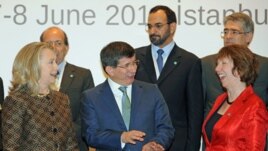Turkey Continues Pursuit of EU Membership
ISTANBUL - Leading European Union (EU) officials have met with their Turkish counterparts in Istanbul in the latest effort to re-energize Turkey's faltering membership bid. There is still enthusiasm for Turkish membership but big obstacles remain.
Under the banner Turkish-EU dialogue, the head of EU foreign affairs Catherine Ashton payed tribute to Turkey's growing regional importance and the nation's increasing cooperation with the rest of Europe.
"I want to say first of all the launch of the "Positive Agenda" [initiative toward Turkish EU membership] I really do hope it will give new momentum to the accession process [for Turkey]," said Ashton. "There is no question that we have an excellent relationship in foreign policy. I believe it is vital that we do given our shared interest in our common neighborhood. "
Ashton praised Turkey's current sheltering of over 20,000 Syrian refugees and its' hosting of two meetings to try and resolve the diplomatic crisis over Iran's nuclear energy program.
It is in this context that Brussels launched the Positive Agenda last month to revitalize Ankara's EU membership bid.
Currently its bid remains frozen due to certain EU member countries blocking the opening and closing of membership requirments Turkey needs to complete to join. To break the impasse the Positive Agenda intiative aims to open informal talks on what is blocking Turkey's bid.
Thursday's meeting in Istanbul saw discussions on easing of visa restrictions for Turks entering EU countries a major point of contention between Ankara and Brussels. But Turkish Foreign Minister Ahmet Davutoglu, while welcoming the move, raised another main point of tension with the EU.
Davutoglu said when Cyprus assumes the European Union presidency in July, Turkey will continue to cooperate with the EU but will not attend any event Cyprus presides over.
Cyprus is divided between Turkish and Greek Cypriots and Ankara refuses to recognize divided Cyprus as a sovereign nation. The dispute is one of the main issues hampering Ankara's EU membership bid.
Another sticking point for Turkey is human rights. EU Enlargement Commissioner Stefan Fule reminded his Turkish counterparts they still have a lot of work to do in that area.
"I have used this meeting to convey our concerns about the increasing detention of lawmakers, academics and students and the freedom of press [in Turkey]," said Fule.
On Thursday two Turkish students were sentenced to 8 years in jail under anti terror laws for unfurling a banner calling for free education during a speech by the prime minister. Under the same laws, human rights groups claim over a 100 journalists remain in jail.
However, observers say despite the numerous problems facing Ankara's EU memberhsip bid, Turkey's growing importance in the region means Brussels is still intereseted in keeping the issue of Turkish membership alive.
Under the banner Turkish-EU dialogue, the head of EU foreign affairs Catherine Ashton payed tribute to Turkey's growing regional importance and the nation's increasing cooperation with the rest of Europe.
"I want to say first of all the launch of the "Positive Agenda" [initiative toward Turkish EU membership] I really do hope it will give new momentum to the accession process [for Turkey]," said Ashton. "There is no question that we have an excellent relationship in foreign policy. I believe it is vital that we do given our shared interest in our common neighborhood. "
Ashton praised Turkey's current sheltering of over 20,000 Syrian refugees and its' hosting of two meetings to try and resolve the diplomatic crisis over Iran's nuclear energy program.
It is in this context that Brussels launched the Positive Agenda last month to revitalize Ankara's EU membership bid.
Currently its bid remains frozen due to certain EU member countries blocking the opening and closing of membership requirments Turkey needs to complete to join. To break the impasse the Positive Agenda intiative aims to open informal talks on what is blocking Turkey's bid.
Thursday's meeting in Istanbul saw discussions on easing of visa restrictions for Turks entering EU countries a major point of contention between Ankara and Brussels. But Turkish Foreign Minister Ahmet Davutoglu, while welcoming the move, raised another main point of tension with the EU.
Davutoglu said when Cyprus assumes the European Union presidency in July, Turkey will continue to cooperate with the EU but will not attend any event Cyprus presides over.
Cyprus is divided between Turkish and Greek Cypriots and Ankara refuses to recognize divided Cyprus as a sovereign nation. The dispute is one of the main issues hampering Ankara's EU membership bid.
Another sticking point for Turkey is human rights. EU Enlargement Commissioner Stefan Fule reminded his Turkish counterparts they still have a lot of work to do in that area.
"I have used this meeting to convey our concerns about the increasing detention of lawmakers, academics and students and the freedom of press [in Turkey]," said Fule.
On Thursday two Turkish students were sentenced to 8 years in jail under anti terror laws for unfurling a banner calling for free education during a speech by the prime minister. Under the same laws, human rights groups claim over a 100 journalists remain in jail.
However, observers say despite the numerous problems facing Ankara's EU memberhsip bid, Turkey's growing importance in the region means Brussels is still intereseted in keeping the issue of Turkish membership alive.


No comments:
Post a Comment